"Metropolis" around the World
By: Aitam Bar-Sagi
The First Season: 1926/7
Germany (First release)
Length: 4189m
Censorship/Classification: 13/11/1926, B.14171, Not for Children
Premiere: 10/01/1927, Berlin, "UFA Palast am Zoo"
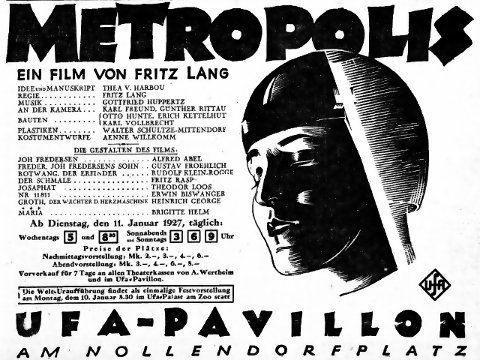
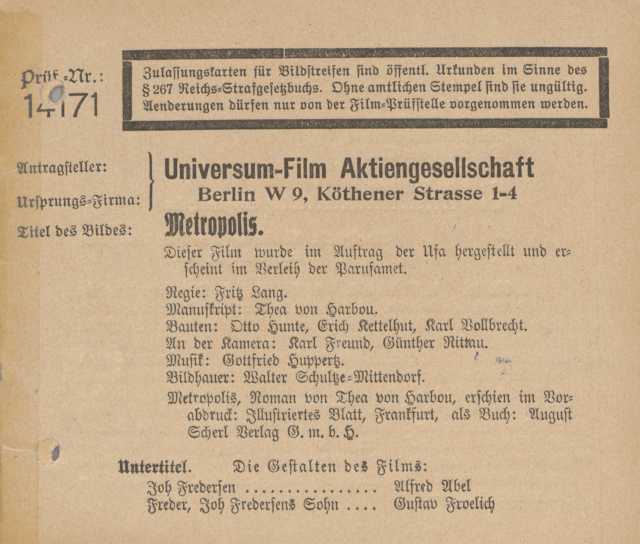
The world premiere of "Metropolis" took place in one Berlin Theatre, and not two as previously written here. Despite some sources suggesting that the premiere took place in two theatres (e.g., "Berliner Tageblatt", 06/01/1927, or "Stuttgarter neues Tagblatt", 11/01/1927), that was not the case. It is indicated indisputably in the UFA records at the Bundesarchiv (Bundesarchiv files, R109/I5760).
Premiere took place with the presence of important people from the Élite of German politics and arts (e.g., Chancellor Wilhelm Marx, Foreign Minister Gustav Stresemann, the minister of defence Otto Gessler, and the President of the Reichsbank Hjalmar Schacht), as well as critics of leading newspapers. The music at the premiere was conducted by Gottfried Huppertz himself. Ticket prices according to ads cost 10, 15, and 20RM. While other prestige UFA premieres, such as "Die Nibelungen", "Der Letzte Mann" or "Zur Chronik von Grieshuus" enjoyed special decoration for the theatre, no special design was applied this time. A published drawn illustration of the UFA Palast am Zoo from premiere night, seen below ("Der Film", Berlin, 15/01/1927), shows that there was only a small sign above the entrance, which read "Welturaufführung" (World Premiere). Due to the lack of any special design no actual photographs of the theatre at premiere night seem to have been made.
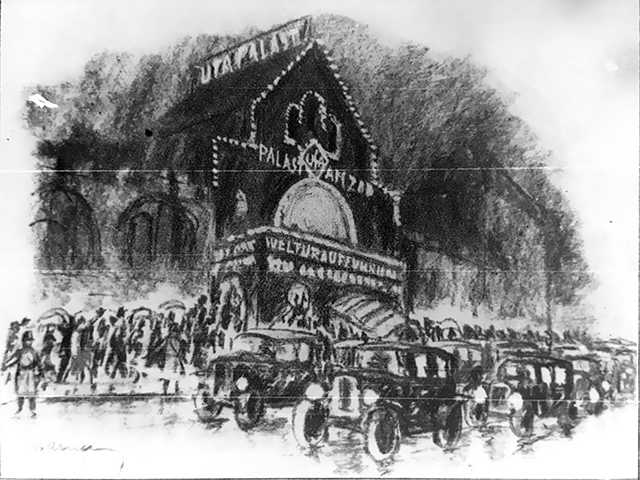

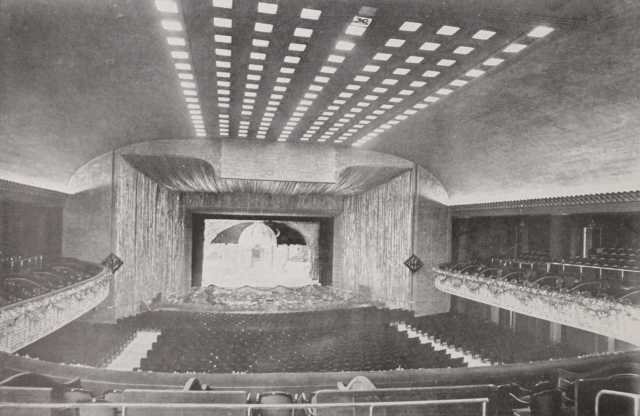
The following day "Metropolis" was moved to exclusively to the UFA Pavillon am Nollendorfplatz where it was shown until 09/05/1927 (The next day the theatre showed the first part of "Der Weltkrieg"). Music conductor: Richard Etlinger. Ticket prices were 2, 3, 4, and 6RM for the evening screening, and 3, 4, 6, and 8RM for Night screenings. In contrast to the common belief, that "Metropolis" was shown in this smaller theatre only after the premiere due to bad press reviews, announcements of the screenings happening at the Pavillon am Nollendorfplatz appeared already as early as 05/01/1927 (e.g., Deutsche Allgemeine Zeitung, 05/01/1927). The silver coating of the building was ready by premiere night (Including light blue inner decoration, and a bronze Gong above the entrance), and is noted in reports before premiere night. Again, this is to show UFA (Or actually Parufamet) wanted "Metropolis" to be shown in the smaller theatre from the beginning, regardless of the bad reviews (Several newspapers suggested it is due to the success of "Ben Hur" in that Theatre).
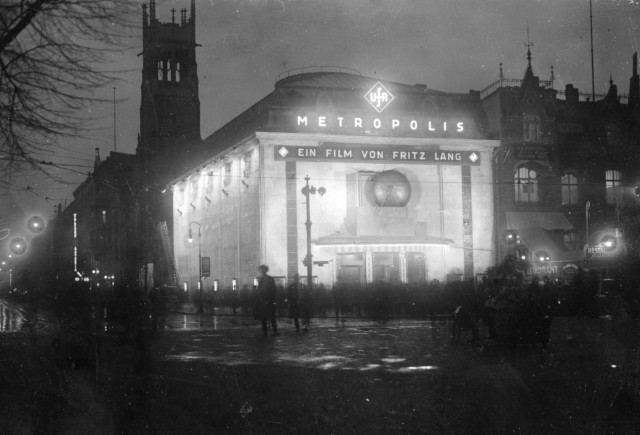
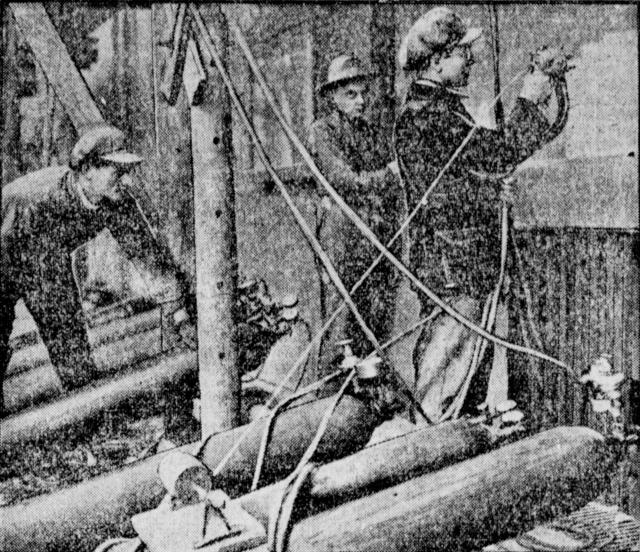
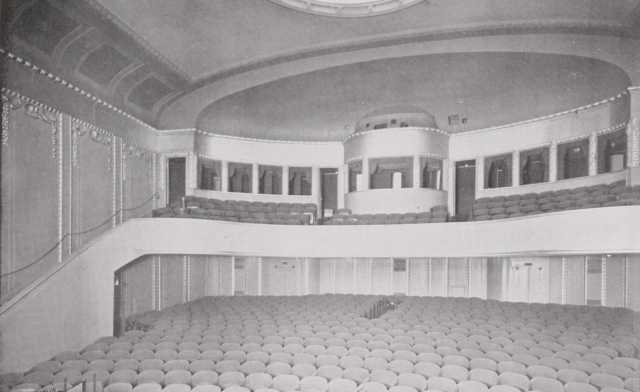
The film’s running time was between 135 (Hans Erdmann, "Filmmusik", Reichsfilmblatt, Nr. 4, 1927) to 140 (Balthasar (Roland Schacht), "Der Metropolis Film", Das Blaue Heft, Nr. 3, 1927) minutes, excluding intermission, which translates to a speed of 26 to 27 frames per second. This corresponds with the handwritten notes by Gottfried Huppertz on his copy of the "Metropolis" script, where is repeatedly noted a speed of half a Meter per second (e.g., for scene 55, on page 74, it is noted: "93m = 186sek")
Despite the belief that around 15,000 people saw "Metropolis" at its Berlin premiere (Enno Patalas, "Metropolis In/Aus Trümmern"), Numbers from the UFA records at the Bundesarchiv (again, B.A. R109/I5760) covering most of the presentation period (11/01/1927 to 12/04/1927; Records for premiere night, 3 days in this duration, as well as the period of 13/04/1927 to 09/05/1927, are missing) show that 75,560 tickets were sold for the film, grossing UFA a total of 253,133RM.
Fast decline in ticket sales after the second week, however, lead early plans to release "Metropolis" throughout Germany starting early February (Börsenblatt für den Deutschen Buchhandel, 08/01/1927), having for example a release in Stuttgart on 08/03/1927 (Stuttgarter Neues Tagblatt, 27/01/1927), to be canceled. It was then decided upon a newly scheduled general release at the Mid-to-end of August 1927, upon which UFA hoped to gross a few more hundred thousend Reichmarks (UFA Board meeting minutes, Nr. 4, 08/04/1927, and Nr. 17, 27/04/1927, Bundesarchiv, R109/I1026a).
Further notes:
- One day before the premiere Fritz Lang gave a speech on the Berlin-Sender Radio Station about "Metropolis" (See: "Kritik Der Leinwand", Die Filmwoche, Nr. 3, 1927). It is, however, not the speech which was later featured on the 12" VOX Shellac record Nr. 08386. The speech was given at the program "Filmgeheimnisse", which ran from 19:55 to 20:30.
- A later radio transmission in Breslau (Today Wrocław in Poland), dating 07/02/1927, featured a reading from Thea von Harbou’s "Metropolis" script, as well as musical extract from Gottfried Huppertz’ music for the film.
- A print of "Metropolis" reached the town of Stettin (Today Szczecin in Poland) around June 1927 through Parufamet's rental service, when according to agreements it should have waited until August (UFA Board meeting minutes, Nr. 67, 27/06/1927, Bundesarchiv, R109/I1026a). Whether it was actually screened, and of what version it was, is not known because apparently newspapers from the city survived the Second World War only in fragmented form.
Austria
Length: 4224m
Censorship/Classification: between 31/01/1927 to 05/02/1927
Premiere: 07/02/1927, Vienna, "Löwen Kino"
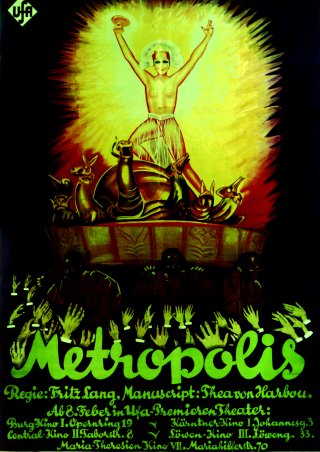
The premiere of the film lasted, including intermission, 165minutes (20:45 to 23:30), and was accompanied with the music by Gottfried Huppertz ("Neue Freie Presse", Vienna, 08/02/1927). Subsequent screenings are reported with the same length. At the premiere were present, as was at the Berlin premiere, many important people, including Bundespräsident Hainisch, Präsident des Nationalrates Waber, Vizekanzler Dinghofer and UFA's general director Bausback. The premiere of the film was a failure and the showing ended in almost silent applause. (Ditto)
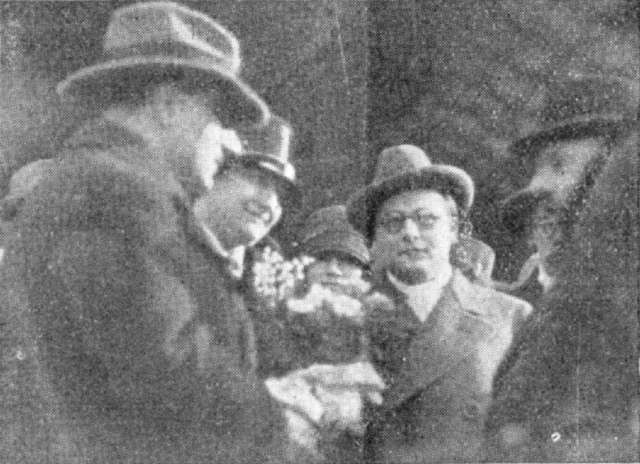
Starting 08/02/1927, the film was shown in five Viennese cinemas: "Burg Kino", "Central Kino", "Kärntner Kino", "Löwen Kino" and "Maria-Theresien Kino". Some reviews briefly mention Hel and "Der Schmale". From available information, it is possible to conclude the version shown in this country was identical to the German premiere version.
Additional Sources: "Wiener Sonn-und Montags-Zeitung", 07/02/1927; "Wiener Zeitung", #32, 09/02/27; "Die Neue Zeitung", 09/02/27; "Wiener Sonn- und Montags-Zeitung", 14/02/27; "Entscheidungen der Wiener Filmzensur", Paolo Caneppele, 2002, Film archive Austria.
Hungary
Length: 4365m
Censorship/classification: Unknown
Premiere: 17/02/1927, Budapest, "Urania", "Onmia" and "Capitol"
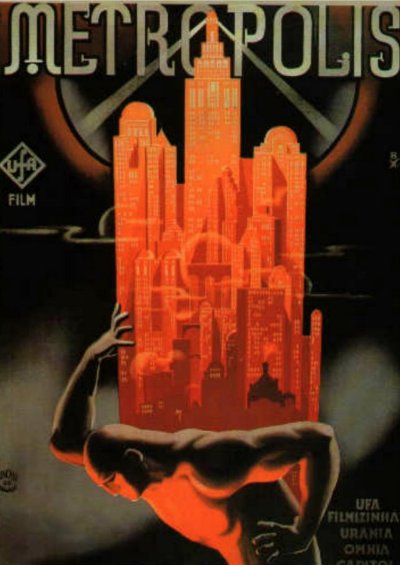
A film review of "Ben Hur" from 16/01/1927 ("Nyugat" periodical) notes that "Metropolis" will arrive in February. The review for "Metropolis," from 16/02/1927 (also from the "Nyugat" Periodical), Only gives one piece of useful information: a note of the music being made by Gottfried Huppertz. The theatre poster below, from the "Omnia" Theatre in Budapest, notes the Film uses Gottfried Huppertz' Music, conducted by a 20-piece Orchestra. Length is given at Belügyi Közlöny Nr. 9, 27/02/1927
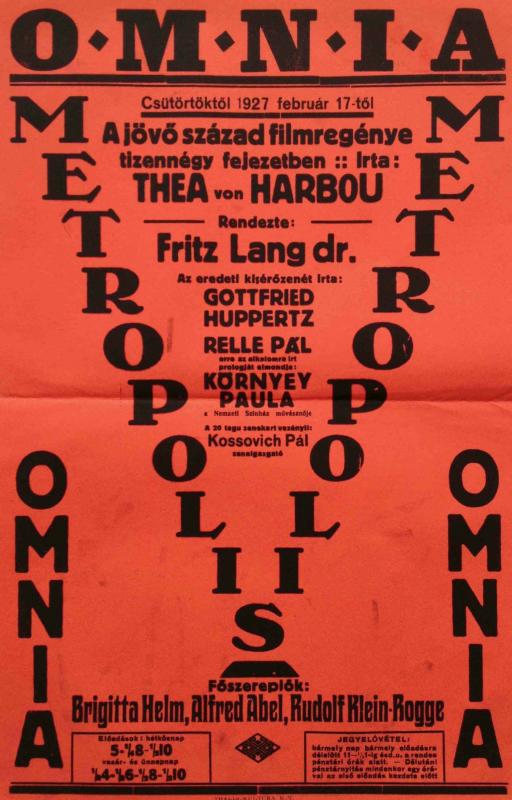
The Netherlands
Length: 4488m
Censorship/Classification: Unknown
Premiere: 18/02/1927, The Hague, "Asta"; Rotterdam, "Luxor Theater"; Amsterdam, "Rembrandt Theater"; Groningen, "Luxor"
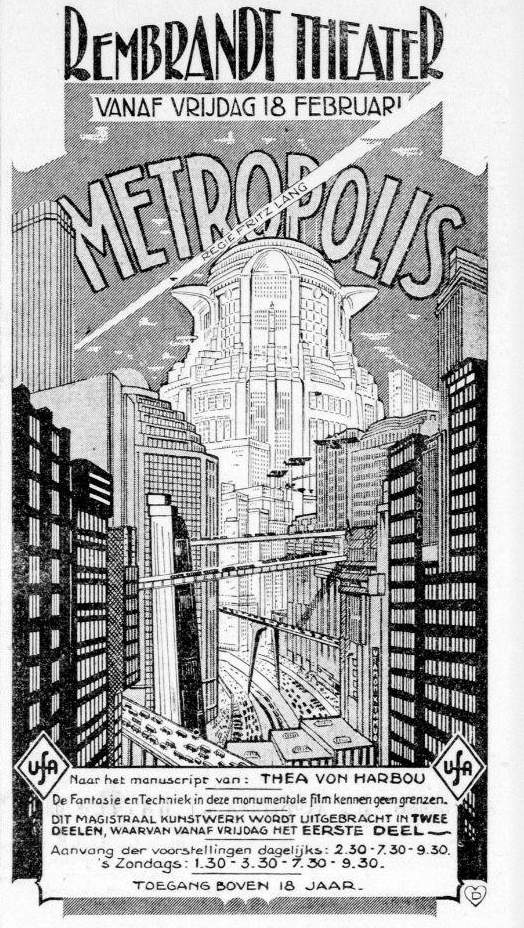
Before official premiere, there were two Press screenings: 15/02/1927 in the "Rembrandt Theater", Amsterdam, and 16/02/1927 in the "Luxor Theater" in Rotterdam. In the Netherlands "Metropolis" was presented as a two-part Film. The first part was named "Het moderne Babylon" ("The modern Babylon") and the second part was named "De valsche Maria" ("The false Maria"). Alternately, sometimes the parts were referred as "Metropolis 1" and "Metropolis 2", or collectively as "Metropolis" when shown together.
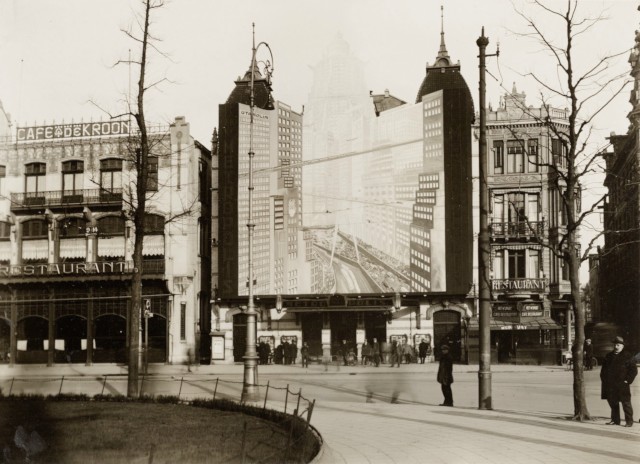
The second part of "Metropolis" premiered in Groningen on 25/02/1927. In the other cities due to high number of visitors it was postponed, starting 02/03/1927 in Rotterdam, and 04/03/1927 in The Hague and Amsterdam. The following years, however, the two parts were shown together and not on different dates. The film was presented with the music of Gottfried Huppertz on both parts.
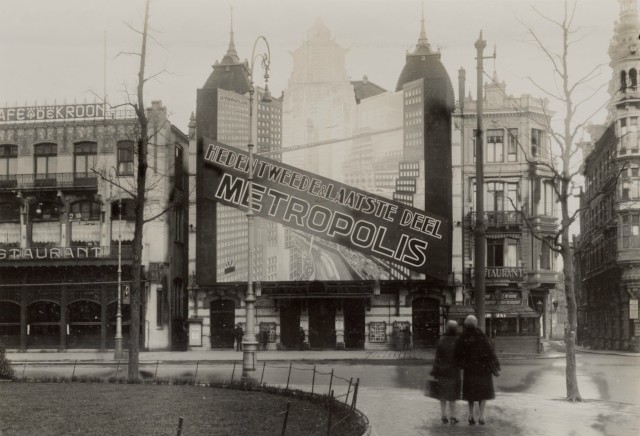
The length of 4488m comes from Censorship notes from the National Archives in Hague, which specify the following information:
File #02290, 11/10/1928:
Metropolis I, 2602m, no cutsFile #02291, 11/10/1928: Metropolis II, 1866m, Two cuts, total 20m:
"Tusschen titel 134 en 135 moet dansscene vervallen, zoo ook de dansscene voor titel 145" (Between titles #134 and #135 the Dance-Scene must be dropped; similarly the Dance scene before title #145)
That is, part of the dance in "Yoshiwara" shown during Freder's illness, and its repeatance when Josaphat visits Freder's room later in the film
The long length is due to repeating footage (and openning credits) in the second part. These notes show that in October 1928 a practically complete print was still in the Netherlands. This could be extended further to the latest date in which a newspaper ad explicitly noted "Metropolis" as a two-part film, in 17/10/1930, where screenings took place until 23/10/1930 ("Niewsblad van het noorden", 16/10/1930, Groningen), and the last time an ad notes the length as 15 acts is 21/04/1931 ("Schiedamsche Courant", 17/04/1931). Of running time, I found only one notice that states 180 minutes, but one should account roundings, the longer length, and the fact most likely two intermissions are taken into account ("De Groene Amsterdammer", Nr. 2592, 26/02/1927).
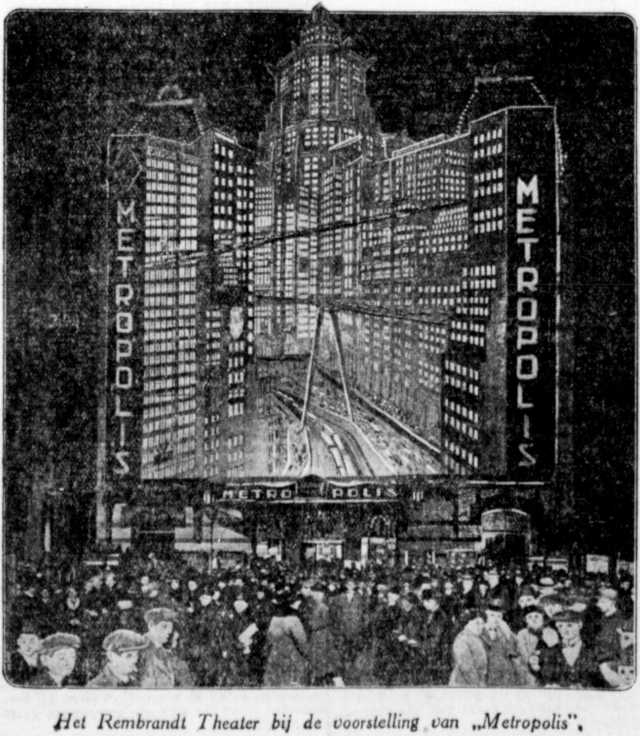
Interesting sidenote is that while the name "HEL" supposedly caused problems in the U.S. due to its similarity to the word "Hell", no one seems to have had a problem with the name in the Netherlands, where that is the exact spelling for "Hell" or "Inferno" (i.e., the second part of Fritz Lang’s Dr. Mabuse was released in the Netherlands as "Dr. Mabuse: De Hel").
Additional Sources: "Niewe Rotterdamsche courant", 17/02/1927; "Het Vaderland" 03/03/1927; Cinema Context F005391
Switzerland
Length: Unknown
Censorship/Classification: Unknown
Premiere: 21/02/1927, St. Moritz, "Monopol"
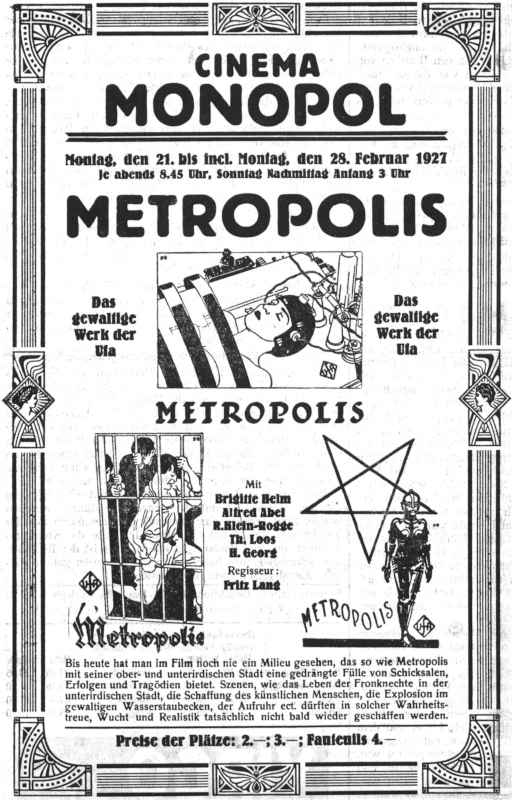
Additional releases dates: 22/02/1927, Bern, "Splendid Palace"; around 04/03/1927 in Basel; 25/03/1927, Geneva, "Alhambra" (Geneva classification on 14/03/1927)
Norway
Length: 2447m
Censorship/classification: 28/02/1927, 16 years and above
Premiere: 28/02/1927, Oslo, "Kino Palæet" and "Cirkus Verdensteater"
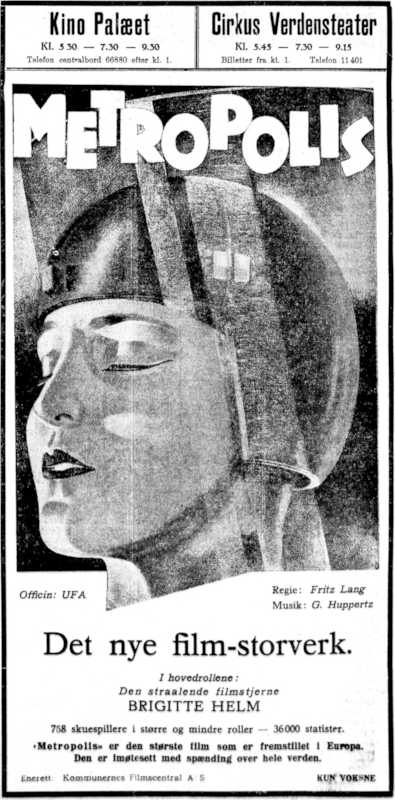
This is apparently the shortest version of "Metropolis" to be shown in Europe. The Norwegian Media Authority (Medietilsynet) notes of the following cuts:
- II akt. Naken kvinde 2 1/2 meter (2nd act, Naked Woman, 2.5m)
- V akt. Uskjøn dans 13 meter (5th act, Mysterious dance, 13m)
- VI akt. Slagsmaal 5 meter (6th act, Battle, 5m)
- VIII akt. Stort hode i flammerne 2 meter (8th act, head close-up in flames, 2m)
(Total cuts: 22.5m)
The Norwegian "Aftenposten" ad that states the usage of Gottfried Huppertz's music is most likely a mistake, due to the fact almost half the film is gone.
Information used to be at: http://film.medietilsynet.no/Filmdatabase?Id=14531a , but sadly the website is now gone, and the new website does not provide as much information.
Denmark
Length: ~2700m (9 acts)
Censorship/Classification: Unknown
Premiere: 05/03/1927, Kopenhagen, "Palads"
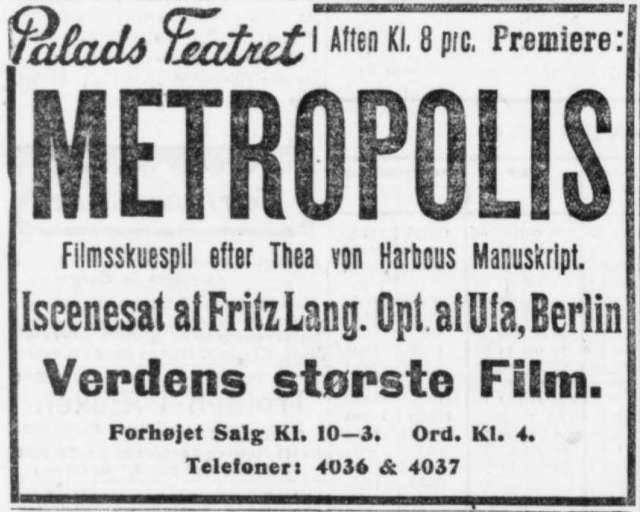
Film program distributed in Denmark described the film as "9 acts". The Danish Film Institute, however, write the length of the 1984 Giorgio Moroder release: https://www.dfi.dk/viden-om-film/filmdatabasen/film/metropolis
United States of America (Roadshow Release)
Length: 3170m (10400ft)
Censorship/Classification: Unknown
Premiere: 05/03/1927, New-York City, "Rialto"
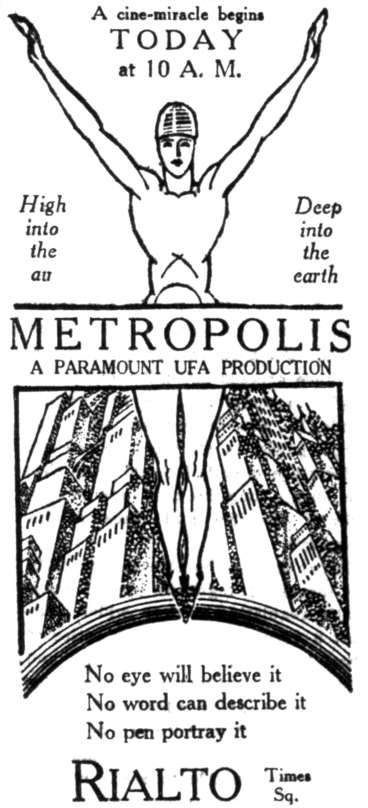
After a print of the film was sent to Paramount in December 1926 the chief executive Walter Wanger assigned Channing Pollock to re-write the titles and to be edited by Julian Johnson and Edgar Adams. In addition to the many cuts, the film’s plot was severely changed, and new names were given to most characters.
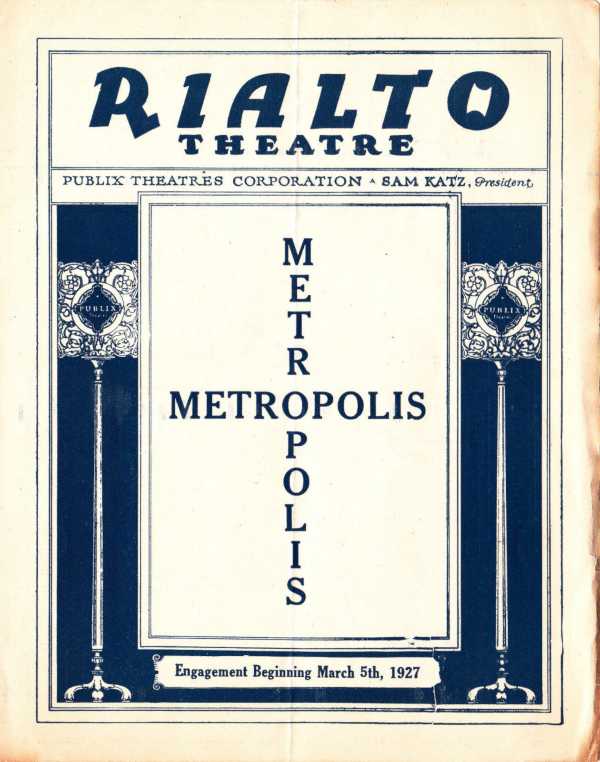
A Nice piece of trivia is the fact that Lang hated this version so much he declared he would "never work in America". Naturally, as all know, Lang eventually immigrated to the U.S. in 1933, but what is always overlooked is the ironic fact Lang actually ended teaming up with Walter Wanger to create "Diana productions", Which among other Lang Films produced "Scarlet Street".
Latvia
Length: Complete (~4189m?)
Censorship/Classification: Unknown
Premiere: 06/03/1927, Riga, "Splendid Palace"
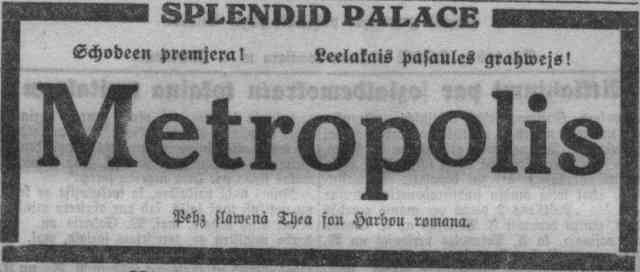
The film was shown in two parts. Starting the day after premiere the film was also shown also in the A.T. Kino. From 14/03/1927 the two theatres started showing the second part of the Film.

Estonia
Length: Complete (~4189m?)
Censorship/Classification: Unknown
Premiere: 12/03/1927, Tallinn, "Gloria-Palace"

In some places (as above ad), one can see the film was presented in two parts, with part 2 starting 20/03/1927. Newspaper ads in other instances note the films as "15 acts" and having Gottfried Huppertz' music.
Sources: "Päewalehht", 20/03/1927, Tallinn; "Postimees", 04/04/1927, Tartu
United Kingdom
Length: around 3048m (10000ft)
Censorship/Classification: 18/03/1927, AFF063928, "A" Category
Premiere: 21/03/1927, London, "Marble Arch Pavilion"
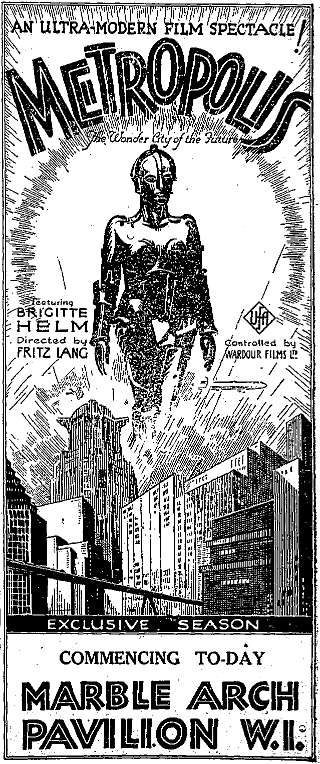
Based on the U.S. "Pollock version" (due to a pre-signed agreement between the local distributer and Paramount, where the later would edit films for UK distribution), although made from an export copy of the film, it was further cut by the BBFC (British Board of Film Censorship). The above noted length comes from contemporary reviews ("The Bioscope" and "Kinematograph Weekly", both dating 24/03/1927). The BBFC does not provide any information but the obscure fact the film had a running time of 118 minutes and 13 seconds before any cuts were made. Unlike in the U.S, it seems here reports were much more aware, and critical of Channing Pollock's part in the film's editing and titeling. Especially negative (about the titles and the film in general) was author Arnold Bennett: "’Adapted by Channing Pollock.’ Good God! What captions. Enough to make you give up the ghost." ("The Journals of Arnold Bennett", entry for 03/08/1927). To those unfamiliar with the English term, one can sum up the fact the Inter-titles caused him to have suicidal thoughts (no less!). "Metropolis" shown in the Premiere theatre until 25/04/1927, presumably with an amalgamated score of Huppertz and other composers which was prepared by the Theatre's musical director, W. E. Hodgson (The Bioscope, Service Supplement, 31/03/1927), and then moved to the "Academy Theatre" in Brighton. General release started on August 1927, with "Stoll Theatre" and "Shepherds Bush Pavilion" in London receiving the film starting 26/09/1927.
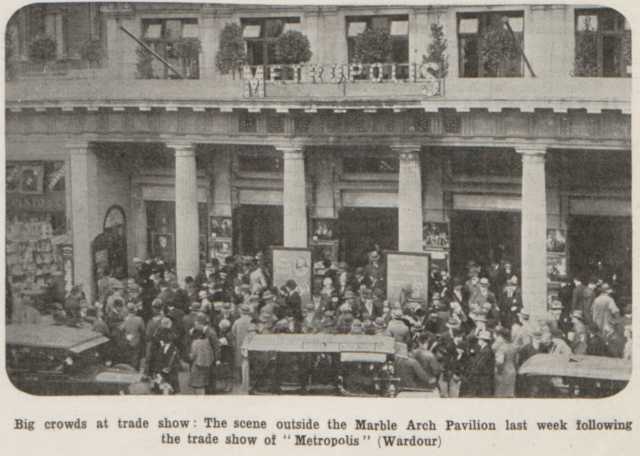
Classification information: https://www.bbfc.co.uk/release/metropolis-q29sbgvjdglvbjpwwc0yndy3ntk
Finland
Length: Unknown
Censorship/Classification: Unknown
Premiere: 21/03/1927, Helsinki, "Capitol"
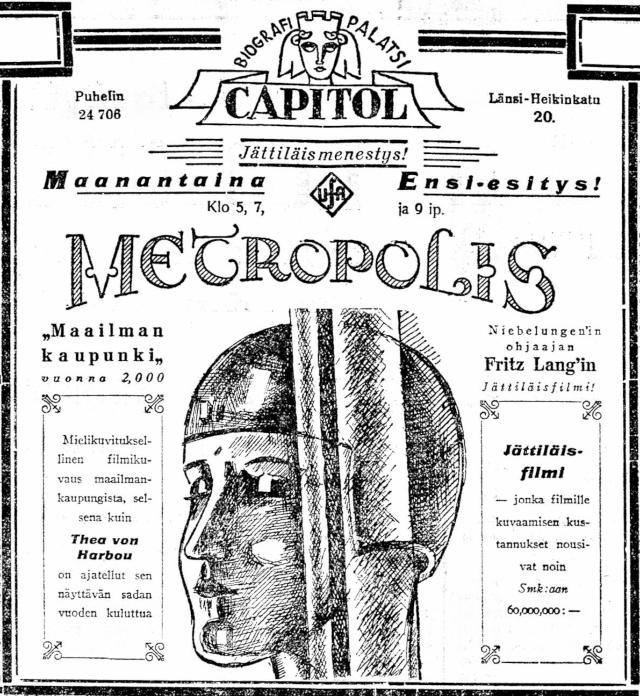
Release date and location according to a database maintained by the Finnish Board of Film Classification (Valtion elokuvatarkastamo, VET) and the National Audiovisual Archive. A credit there is given to Gottfried Huppertz, but it is possible this was added in retrospect.
Source: https://elonet.finna.fi/Record/kavi.elonet_elokuva_146544
Sweden
Length: 2560m
Censorship/Classification: Feb. 1927, 38458, 15 years and above
Premiere: 04/04/1927, Stockholm, "Palladium"
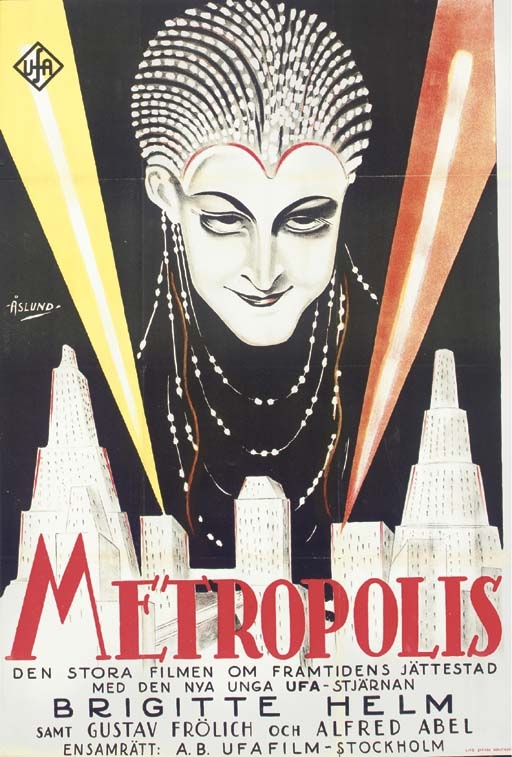
Submitted at 2734m (Or 2717m?), it was cut by censorship to 2560m. Two names were changed in this release: Freder was named Georg, while his father was named Karl Krafft. Information is from the "Svenska Filminstitutet". Credit to Gottfried Huppertz and Konrad Elfers is naturally given there in retrospect.
Source: http://www.sfi.se/en-GB/Swedish-film-database/Item/?itemid=13489&type=MOVIE
Yugoslavia
Length: Probably complete (~4189m)
Censorship/Classification: Unknown
Premiere: probably 04/04/1927, Belgrade, "Колосеум".
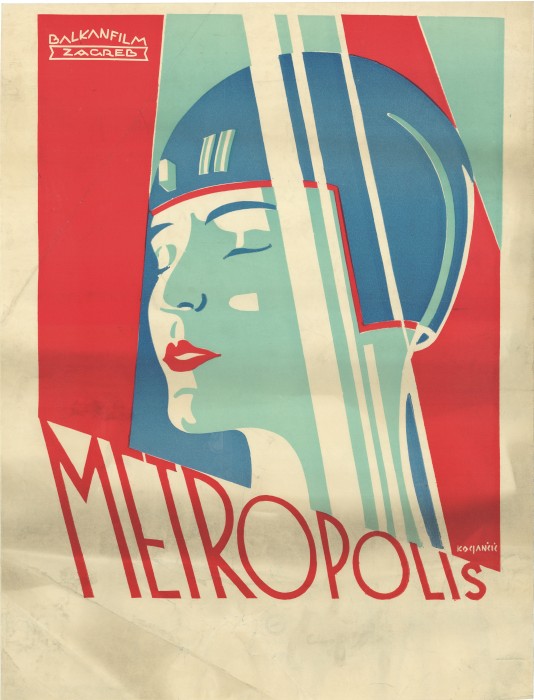
Newspaper ads and promotional material note the Film is 14 Acts and Two parts, although in some places (for example in Ljubljiana, where the film premiered 14/04/1927), the two parts were shown consecutively which led to a warning that the presentetion lasts for Three Hours. Few sources also note the usage of Gottfried Huppertz' music.
Romania
Length: Probably complete (~4189m)
Censorship/Classification: Unknown
Premiere: 08/04/1927, Apollo-Astra Cinema, Brasov
Bucharest Premiere at the Cinema Odeon, on 21/04/1927, and on the 27/04/1927 the film was seen by the Romainian Royal Family, headed by Queen Maria. The film was 14 acts and, in some cities, divided into two parts (eg. on 01/05/1927 in "Apollo", Arad).
Spain
Length: Complete (4189m?)
Censorship/Classification: Unknown
Premiere: 09/05/1927, Barcelona, "Kursaal" and "Cataluña"
In Spain "Metropolis" was presented as a two-part film. The second part premiered on 16/05/1927, although there is no clear naming separation between parts in newspaper ads. The film's complete title was: "Metrópolis: La Ciudad sobre las Ciudades" (Metropolis: the city over cities). From a film synopsis in the Film journal "Popular Film", one can tells of Georgy's visit to Yoshiwara and Freder's visit to Josaphat. All plot elements are there, and only alternation is the (odd) naming of "Der Schmale" as "Perner". The film's Inter-titles were re-written locally by playwright Manuel Linares Rivas. The only review I found that addressed these titles was negative, saying they were too verbal, and stating the obvious. The film reached Madrid only on 23/01/1928 ("Real" Cinema), where it was shown in a cut version (unknown length). Later, in April, the version shown in Barcelona was also shown in Madrid, but I could not find any information as for whether the film was shown there in two parts too. It was then noted that the film in the Barcelona edition was 14 acts, with titles by Linares-Rivas, and a female Soprano singer.
Ireland
Length: Probably 3050m
Censorship: Unknown
Premiere: 15/05/1927, Corinthian, Dublin
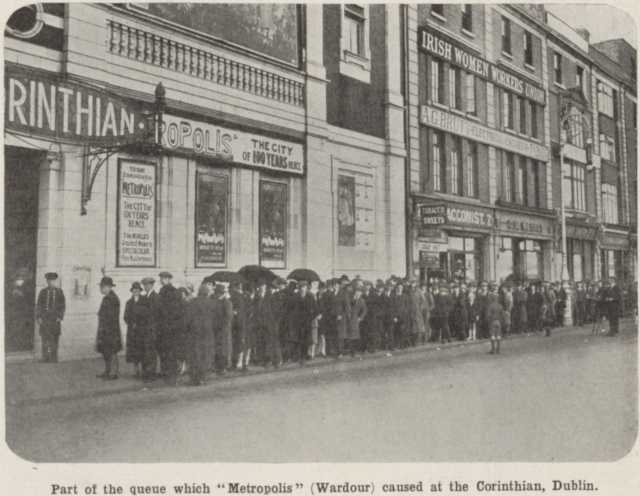
Release date from the "Irish Independent" newspaper. Most likely it was as the version shown in the U.K., as it was distributed by the same company.
The Second Season: 1927/8
United States (General release)
Length: 2450m (8039ft)
Censorship/Classification: Copyright, LP24298, 13/08/1927
Premiere: 13/08/1927
This was cut from the Pollock version to an even shorter length.
Germany (General release)
Length: 3241m
Censorship/Classification: 05/08/1927, B.16285, Jugendverbot
Premiere: 25/08/1927, Munich, "Sendliger-Tor-Lichtspiele"; Stuttgart, "UFA Palast"; Wiesbaden, "UFA Palast"
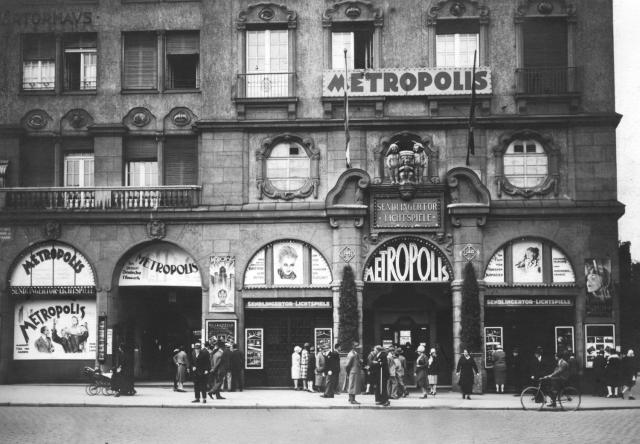
Cutting of this version was done locally by Paul Nothmann (Under the pseudonym Paul Reno), a dramaturge of Parufamet, and was largely based on the cuts made in the Paramount Roadshow version, though staying away from the Pollock titling which according to the UFA management had "Communist tendency" (UFA Board meeting minutes, Nr. 3, 07/04/1927, Bundesarchiv, R109/I1026a).
Music conductor in Stuttgart: Martin Niedermayer, and In Wiesbaden: Paul Dessau. The shortened version was then shown the following day on 25 German cities (for example in Berlin at the "UFA Palast am Zoo", for one week only, followed by other Berlin Cinemas). By 28/08/1927 the film was already shown at 50 different German cities.
Accounting the review of Balthasar (Roland Schacht, Blaue Heft, September 1927), the film, lasting only 80 minutes, must have been shown in 35 to 36 frames per second, which sounds illogical. It might be transcription error, and the length should be 100 minutes, giving a more "logical" speed of about 28 frames per second, as noted on a copy of Huppertz' music treated for the second release.
Unlike the original release, this time the music featured only few motives from Gottfried Huppertz’ score. Originally UFA wanted Parufamet to fund the adaptation and Orchestration of Huppertz' music to fit the new editing of the Film, but because they did not agree to give the money (Estimated at 1,500 to 2,000RM) the idea was abandoned (UFA Board meeting minutes, Nr. 71 and Nr. 74, 01 and 05/07/1927, Bundesarchiv, R109/I1026a). Huppertz still received Screen and Newspaper-ads credit as composer, but it is practically impossible to know when and where his music was actually used. While there seems to be no existing documents about the exact musical score used with this release, some reviews and newspaper clippings from the Huppertz estate shad the following bits of information:
- The Metropolis-Motiv is in 4/4 tempo and C-Major. Huppertz' composed Motiv is indeed as such, though this description is too general, and it might be some other musical piece.
- Stadium music is played at 8/9 tempo, and incorperates the Freder Motive. This is far more specific and fits the description of Huppertz' music, so it is safe to assume these were used in the shortened version.
- Maria's Motive sounds like something from "Tod und Verklärung" (Strauss). This indicates a change as Huppertz' Maria-Motive does not sound like anything from the Strauss Composition.
- For a Party scene the music played is Der Fridericus-Marsch (Radek?).
- Further stock pieces such as selections from "Der Freischütz" by Von Weber, works by Chopin, Traviata, and other material from the Kinothek
In addition to these changes, there were also scores provided locally at some theaters that were compiled by the conductors and had nothing to do with Huppertz at all (See for example an undated compilation score by composer Hans May, found in the Arthur Kleiner collection at the University of Minnesota).
According to the "Freiburger Zeitung" of 16/10/1927: "Der Zettel nennt noch Rollen und Namen, die in der jetzigen Fassung fehlen"; meaning the cast list was left without changes, regardless of the removal of complete sequences which removed characters, or left them unidentifiable.
Canada
Length: 3120m?
Censorship/Classification: Unknown
Premiere: 03/09/1927, Ottawa, "Regent"
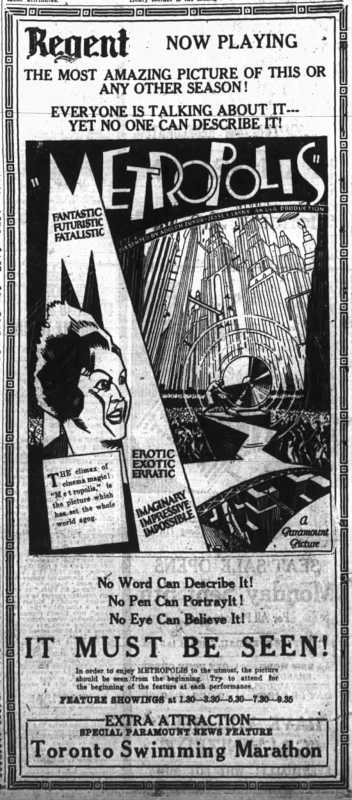
A print was imported from the U.S. sometime in June or July 1927, directly from Paramount. Agreement papers of Paramount with the Canadian distributor can be found at the Cinémathèque Québécoises.
The Film had some Censorship problems in the Province of Quebeq, being banned on 27/07/1927 for being Communist propaganda. On 01/10/1927 the film was approved after having two cuts made:
- V. La fille presque nue (Vue la 1ere fois, la laisser lorsqu'elle semble faire partie du couvercle du coffret)
- VIII. Mary dans les flammes (laisser seulement un flash)
It opened in Montreal on 09/10/1927 at the "Palace" Cinema.
sources: "Dictionnaire de la Censure Au Québec: Littérature et Cinéma" (2006), p. 467; https://www.rcq.gouv.qc.ca/Documents/la_regie/Films%20censur%C3%A9s%201927-1936.pdf
Bulgaria
Length: Unknown
Censorship/classification: Unknown
Showing: 26/09/1927, Sofia, "Odeon"

There exists a Cinema magazine dedicated to "Metropolis" issued on 25/09/1927.
Czechoslovakia
Length: Complete (4189m?)
Censorship/Classification: Unknown
Premiere: 30/09/1927, Prague, "Avion" and "Kapitol"
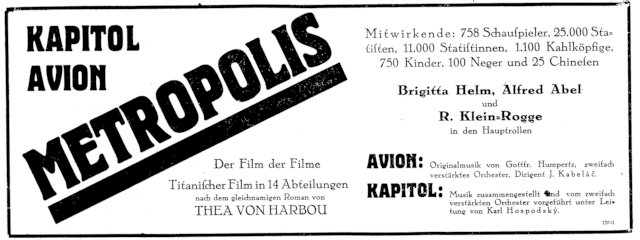
Film is reported as 4200m and 14 acts. The "Avion" used Gottfried Huppertz’ music, while the "Kapitol" used a compilation score by the theatre’s own Karl Hospodsky. The film was shown for two weeks at the "Kapitol", four weeks at the "Avion", and then an extra week at the "Wran-Urania-Kino". It appears that in the city of Brno (Brünn) the film was shown for some reason in two parts, which caused complaints by people who were not aware (due to lack of advertisement) that the film is presented in such form.
France
Length: Complete (4189m?)
Censorship/Classification: Unknown
Premiere: 13/10/1927, Paris, "Lutetia-Wagram"
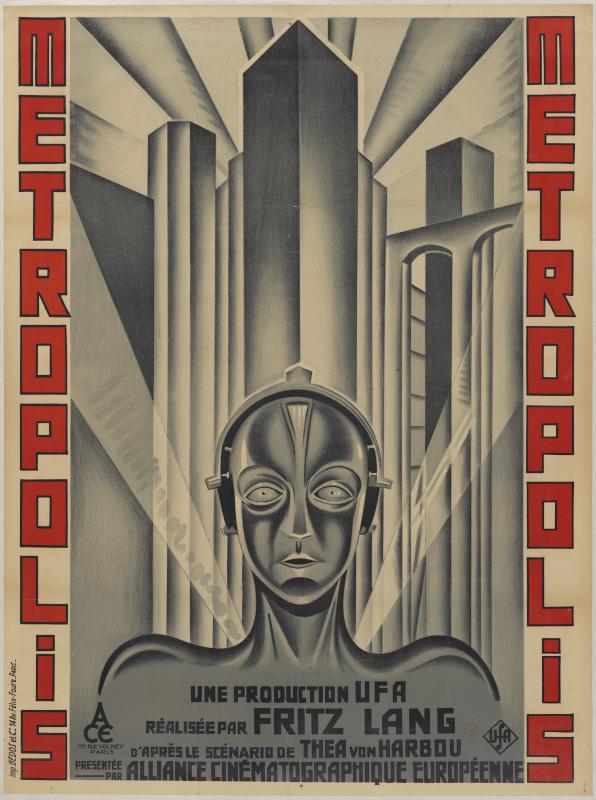
Originally, "Metropolis" was scheduled to premiere on 16/03/1927 (See: Cinémagazine, Nr. 4, 28/01/1927), but that never happened. Two press screenings took place before the premiere: One in "salle de Comœdia" on 05/03/1927 (La Presse, 05/03/1927), and the second on 16/03/1927 at "L'Empire" (Comoedia, 11/03/1927). At the second screening were present Fritz Lang and Thea von Harbou, who visited Paris at the time, and at that screening were several prominent people from the French film industry, most notably, directors Abel Gance and Marcel L'Herbier who reportedly praised Lang for his talent (Figaro, 25/03/1927). It was at that time decided to postpone the film’s release till autumn (to prevent a clash between UFA's "Metropolis" and the then released "Variete" and "Faust"). It should be noted, however, that such postponing of releases was not un-common: Fritz Lang's "Spione" had its first Austrian screening on 16/04/1928 for the press but was eventually released only on 28/08/1928.
Film Journals who gave plot synopsis usually discussed about Georgy's visit to Yoshiwara etc. The film was shown after the premiere at the "L'Imperial" for 3 months, having a short one-week revival at the same theatre in March 1928. According to Film Program handed at L'Imperial, Gottfried Huppertz's Music was used (See also Geiringer, Hans: "La Musique de 'Metropolis'", Comoedia, 21/10/1927)
Poland
Length: Unknown
Censorship/Classification: Unknown
Premiere: 07/10/1927, Warsaw, "Kino Capitol" and "Kino Palace"
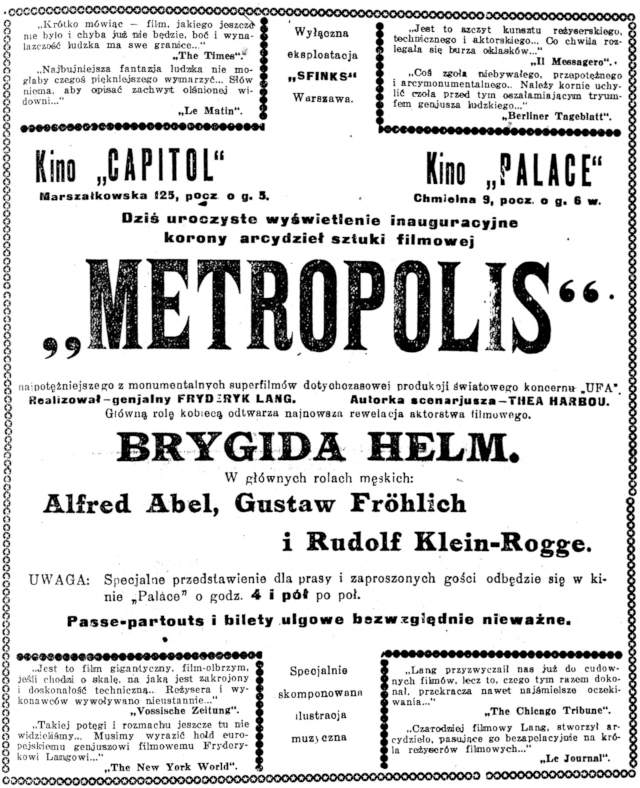
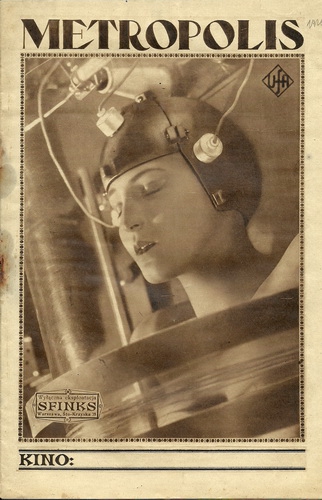
Belgium
Length: Complete? (4189m?)
Censorship/Classification: Unknown
Premiere: 28/10/1927, Antwerp, "Ciné Zoologie"; Brussels, "Cinéma de la Monnaie" and "Victoria Palace"
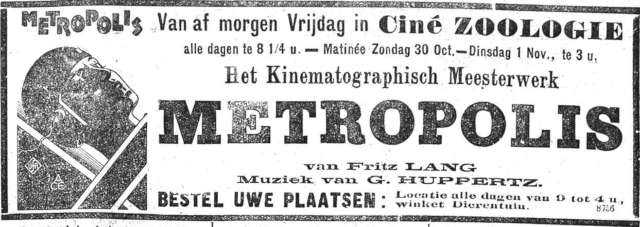
Released in Belgium by ACE, most likely in the same version as in France. In Antwerp also featuring the music of Gottfried Huppertz (No information in Brussels' newspapers about the featured Music).
Turkey
Length: Complete (4189m?)
Censorship/Classification: Unknown
Premiere: 09/11/1927, Istanbul, "Alhambra"
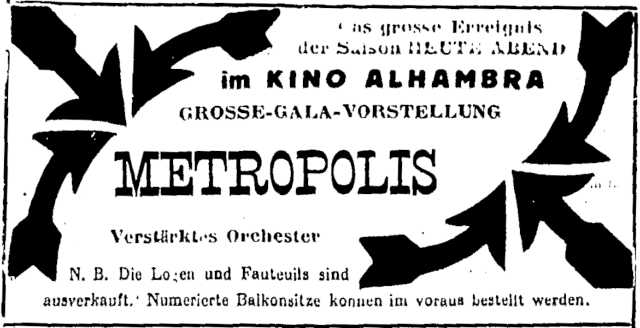
The film was presented in two parts, with the second part premiering on the evening of 16/11/1927.
A Communist terror attack that destroyed a factory on 20/11/1927, causing the film to be banned the day after on the ground of it being Communist propaganda (Not surprising as the second part of the film being shown at the time must have consisted of the workers’ uprising and destruction of machines.) In response the Alhambra theatre owner sent the film for assessment in Ankara, where the ban was lifted. The film could then be shown again without needing any revisions, starting 29/11/1927.
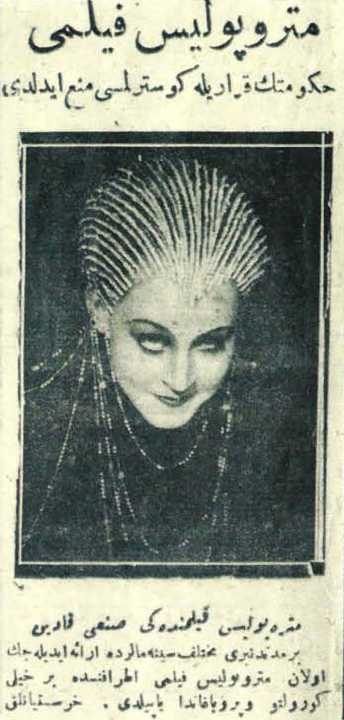
Sources: "Türkische post", 16/11/1927; "Türkische post", 22/11/1927; "Türkische post", 23/11/1927; "Scotsman", 29/11/1927
Lithuania
Length: Complete (4198m?)
Censorship/Classification: Unknown
Premiere: 10/10/1927, Kaunas, "Palace"

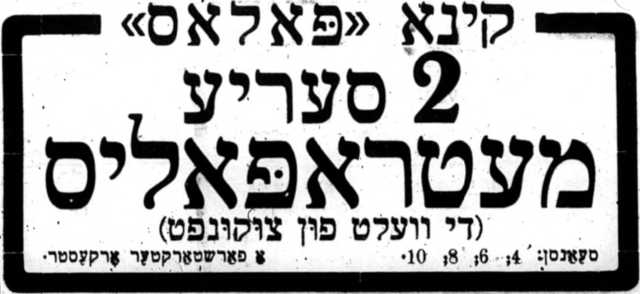
The film was shown in two parts. Second part premiered on 18/10/1927. Premiere in Vilnius (as one film): 23/11/1927, "Helios".
Greece
Length: Unknown
Censorship/Classification: Unknown
Premiere: 08/01/1928, Athens, "Attikon" and "Montial"

Originally planned for release in April 1927, the premiere got postponed repeatedly until the above date. Released as "Η Μητρόπολις" (The Metropolis)
South Africa
Length: 3120m or less
Censorship/Classification: Unknown
Premiere: 22/01/1928, Johannesburg
Release is based on the "Pollock" cut. The print reached South Africa from the U.K.
Source: Eckardt, Michael, "Zur Rezeption des Spielfilms der Weimarer Republik in Südafrika 1928 – 1933", 2007
Algeria
Length: Unknown
Censorship/Classification: Unknown
Premiere: 13/02/1928, Algiers, "Regent Cinema"
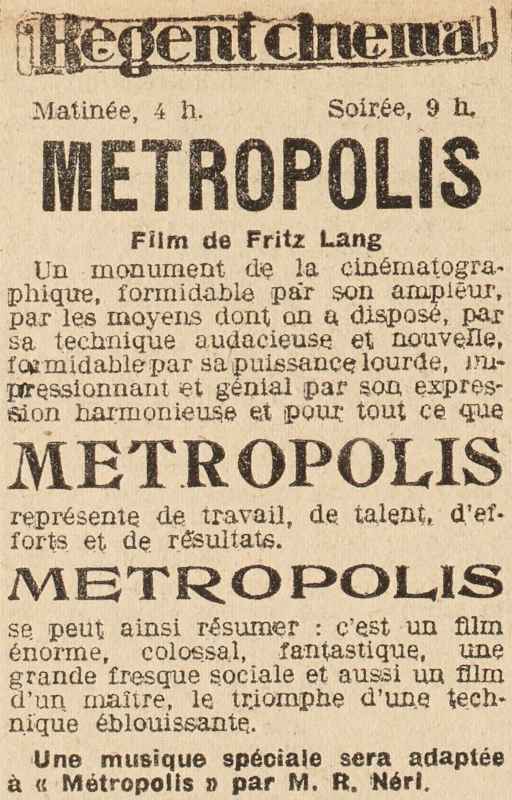
According to "Der Kinematograph" (25/03/1928) "Metropolis" was good Success in the premiere theatre's run.
Iceland
Length: less than 2700m
Censorship/Classification: Unknown
Premiere: 14/02/1928, Reykjavík, "Nýja bíó"
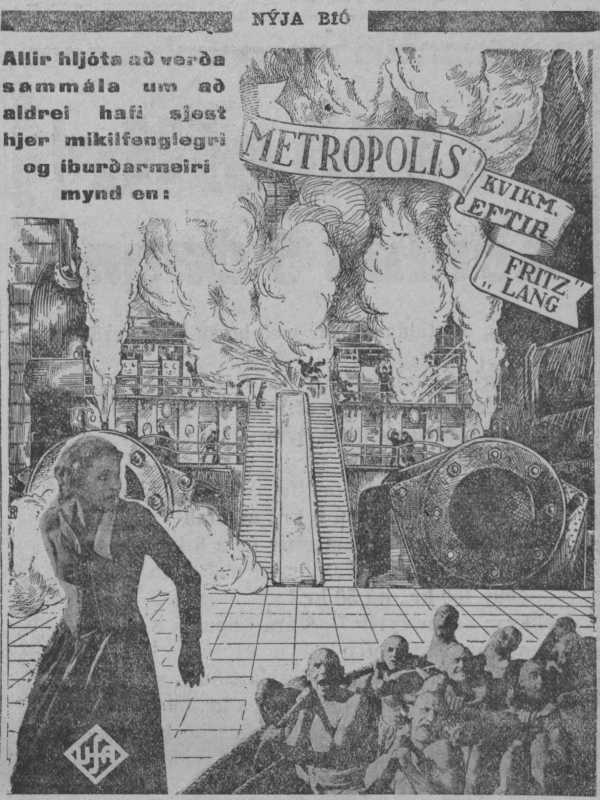
Listed as 9 acts.
Italy
Length: 2881m
Censorship/Classification: 31/12/1927, 23897
Premiere: 20/02/1928, Rome, "Cinema Corso"

In early publicity Material, Freder's name was Glauco. After a short run, however, "Metropolis" was suddenly banned without explanation (Unlike in Turkey, where official reason was given). The film was than re-released in mid-April. In this release Freder's name was changed to Max.
Sources: "Prager Tagblatt" 02/03/1928; "Nieuwe Rotterdamsche Courant", 06/03/1928;"Scotsman", 07/03/1928; "Prager Tagblatt" 13/04/1928
Portugal
Length: 3300m?
Censorship/Classification: February 1928?
Premiere: 07/04/1928, Lisbon, "Cine São Luiz"
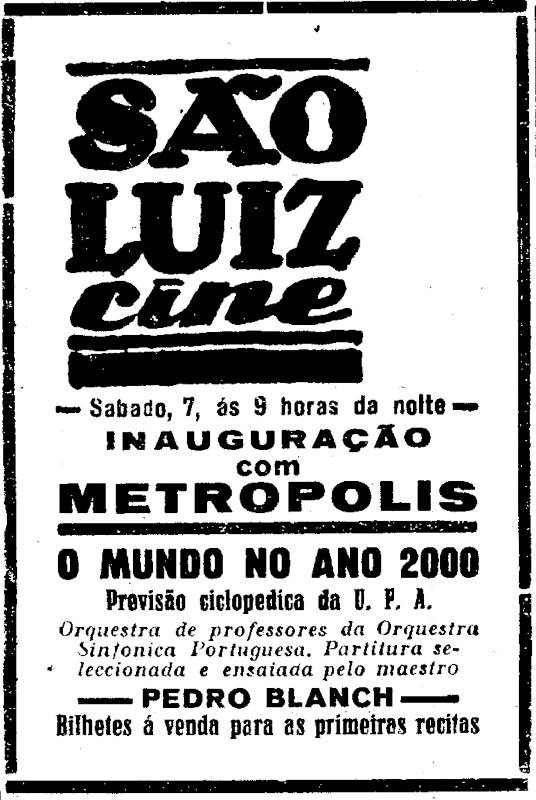
According to the Magazine Cinéfilo (Nr. 1, 02/06/1928), "Metropolis" was at the length of 11 acts.
Additional sources: http://www.teatrosaoluiz.pt/gca/?id=21
Australia
Length: 3120m or less
Censorship/Classification: Unknown
Premiere: 07/04/1928, Melbourne, "Auditorium"

Release is based on the "Pollock" cut. The print reached Australia from the U.K.
Luxemburg
Length: Unknown
Censorship/Classification: Unknown
Premiere: 13/04/1928, "Kino Palace"
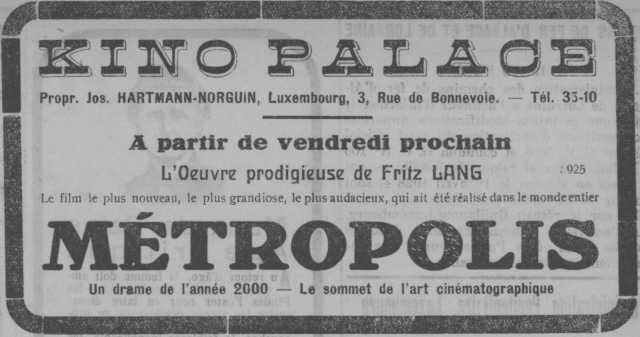
Argentina
Length: 4189m
Censorship/classification: Unknown
Premiere: 06/05/1928, Buenos Aires, "Callao" and "Paris"
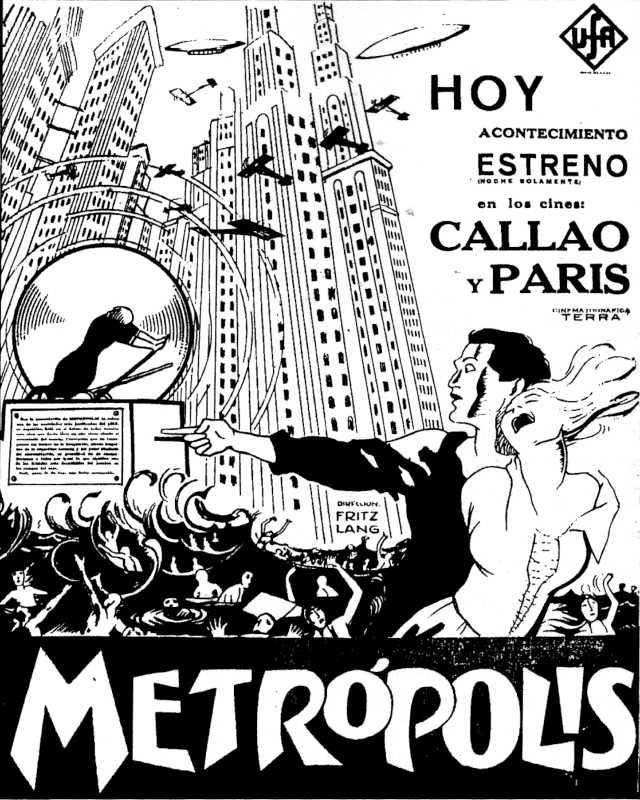
Unlike some reports, it doesn’t seem like a special import: The distributor "Cinematográfica Terra", headed by Adolfo Z. Wilson, had made an agreement with production company UFA already in early 1926 to import several German films, among them the still uncompleted "Metropolis" and "Faust", and have the distribution rights for Argentina, Uruguay, Paraguay, Chile, Peru and Bolivia. The prints were sent to him in late December 1926.
Sources: UFA Files at the Bundesarchiv (R109/I5434); Metropolis Found by Fernando Martín Peña.
Chile
Length: Unknown
Censorship/Classification: Unknown
Premiere: 30/05/1928, Santiago de Chile, "Theatro victoria"; Valparaíso, "Sietembre" and "Condell"
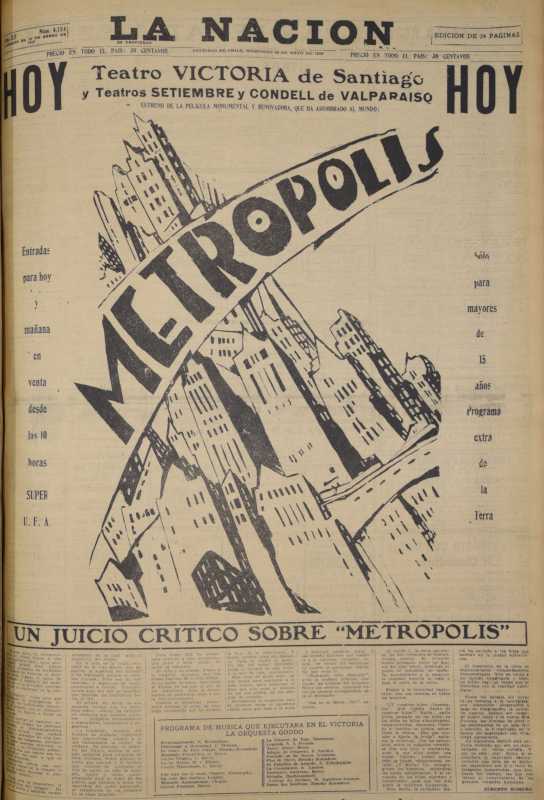
New-Zealand
Length: 3120m or less
Censorship/classification: Unknown
Premiere: 28/06/1928, Auckland, "Everybody's Theatre"
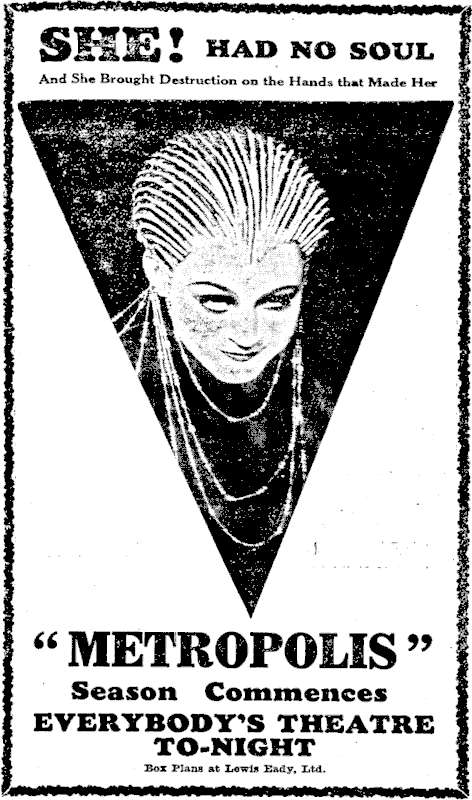
The version shown there was based on the "Pollock cut".
The Third Season: 1928/9
Indonesia
Length: Unknown
Censorship/classification: Unknown
Premiere: 30/07/1928, Surabaya, "Luxor Theater"

The version shown was based on the Pollock cut. The Film was shown in Jakarta on 30/10/1928 at Deca-Park
India
Length: Unknown
Censorship/Classification: Unknown
Premiere: 01/09/1928, Bombay, "Empire Theatre"
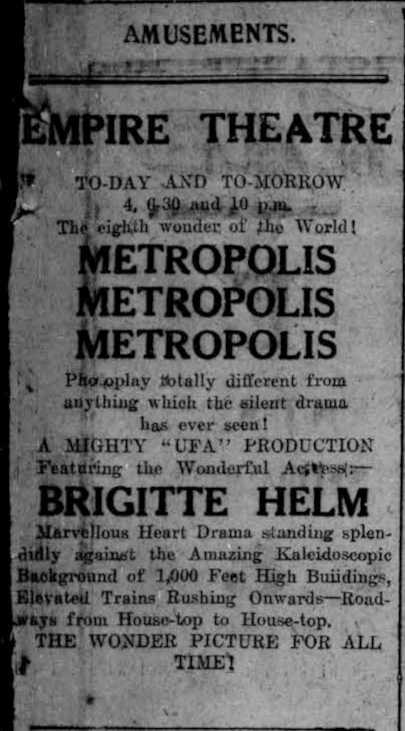
All I could find about the version shown was the following statement:
"There is a body known as the Board of Censors whose
work is supposed to deal with the political,
sex and moral side of pictures, but so far its
activities have been limited to banning a few
unknown films and spoiling by clumsy cuts
well known films such as Metropolis or Notre Dame."
Source: Mukoyi, A. (Of the Indian Bureau of Calcutta), "India and the Cinema World", in "International review of educational Cinematography", League of Nations, Rome, April 1934
Uruguay
Length: Unknown
Censorship/Classification: Unknown
Premiere: 15/09/1928, Montevideo, "Teatro Urquiza"
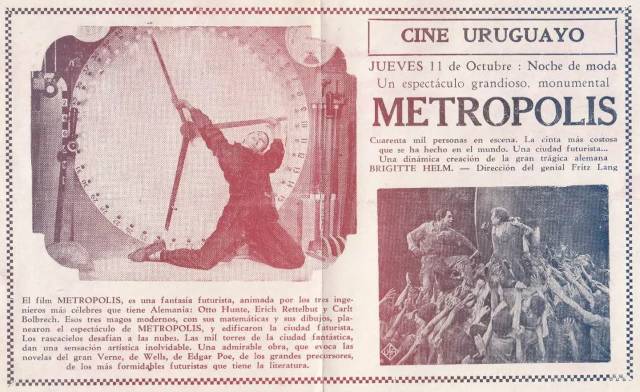
"Cinematográfica Terra" which released "Metropolis" in Argentina was the distributor in Uruguay, with premiere organized by Bernardo Glucksmann.
Source: Duarte, Jacinto A., Dos siglos de publicidad en la historia del Uruguay: desde la fundación de Montevideo, 1726-1952, (Montevideo, 1952)
Brazil
Length: Unknown
Censorship/classification: Unknown
Premiere: 25/10/1928, Rio de Jeniro, "Gloria"

Sao Paulo showings followed on 10/12/1928.
Singapore
Length: Unknown
Censorship/Classification: Unknown
Premiere: 28/11/1928, Singapore, "Alhambra"
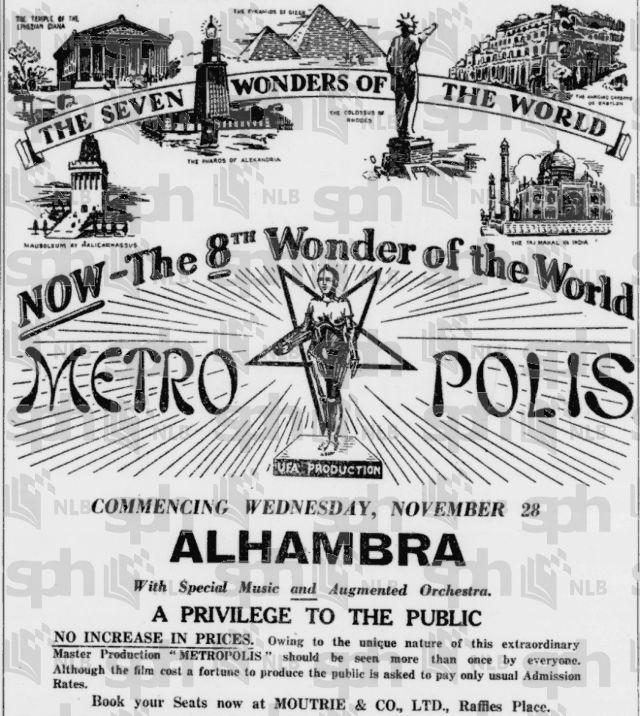
The version shown according to the ads was the pollock version.
Israel
Length: ~2700m (9 acts)
Censorship/Classification: Unknown
Premiere: 08/12/1928, Tel-Aviv, "Eden"

It was shown for about a week, and then additional 3 days (due to "public demand"). Later it was shown in Jerusalem, and in January 1929 for a few days in Haifa, after which the print was shipped back abroad (No country of origin is named). It is possible this was either based on UK release or the Second German version, which would explain the Credits on the Lobby card. Film reported as "9 Large Acts" ("Doar HaYom", 07/01/1929).
Mexico
Length: Unknown
Censorship/Classification: Unknown
Premiere:28/12/1928, Ciudad de Mexico, "Cine Olimpia"
Source: María Luisa Amador, Jorge Ayala Blanco,"Cartelera cinematográfica, 1920-1929" (1999) [Universidad Nacional Autonoma de México, Centro Universitario de Estudios Cinematográficos, Coordinación de Difusión Cultural]
Cuba
Length: Unknown
Censorship/Classification: Unknown
Premiere: 31/01/1929, Havana, "Theatro Encanto"
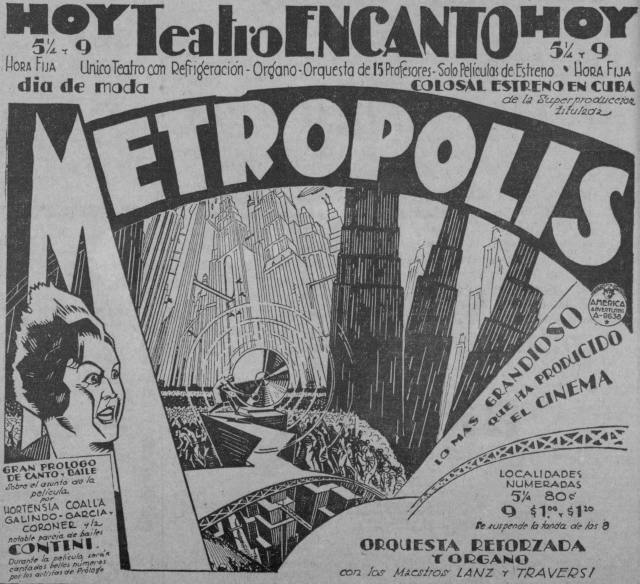
Japan
Length: 2207m
Censorship/Classification: 21/02/1929
Premiere: 03/04/1929, Tokyo, "Syoitiku Kinema"
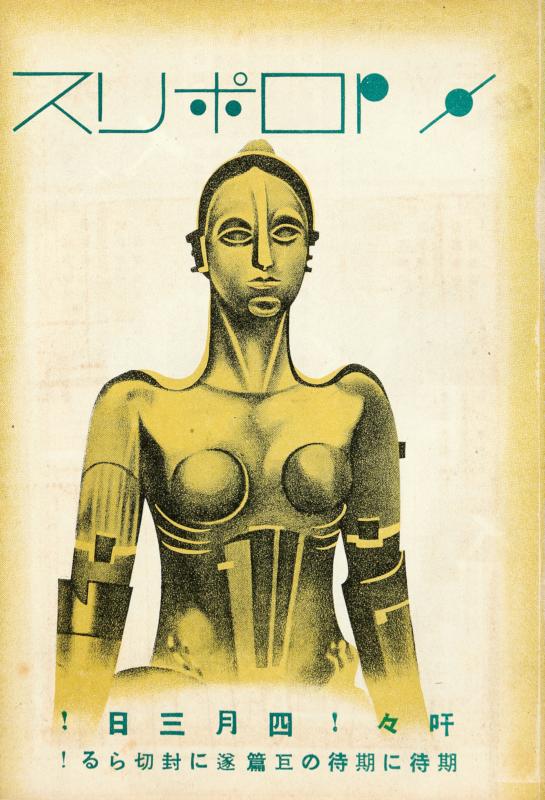
As far as I could understand from a Japanese website using automatic translation: The film was to premiere much earlier, but company holding the copyright went bankrupt. UFA then opened its own Japanese branch, and eventually sold the rights to the TOWA-Company, who released the film in a version based on the Pollock release (Probably the shortened, general US release). I could not find if a Benshi was used.
"Metropolis", or at least Brigitte Helm, must have been popular in Japan, which would explain why the 1934 film "Gold" (with Helm) was named in Japan "Cosmopolis"
This is, as far as I can tell, the shortest print of "Metropolis" to be shown in the 1920’s.
Sources: http://www.kaibido.jp/metp/m_nenpyo.html and https://michaelorganresearch.blogspot.com/2020/05/metropolis-japan-1929-release.html
Thailand
Length: Unknown
Censorship/Classification: Unknown
Premiere: 03/04/1929, Bangkok, "Phathanakorn Cinema"
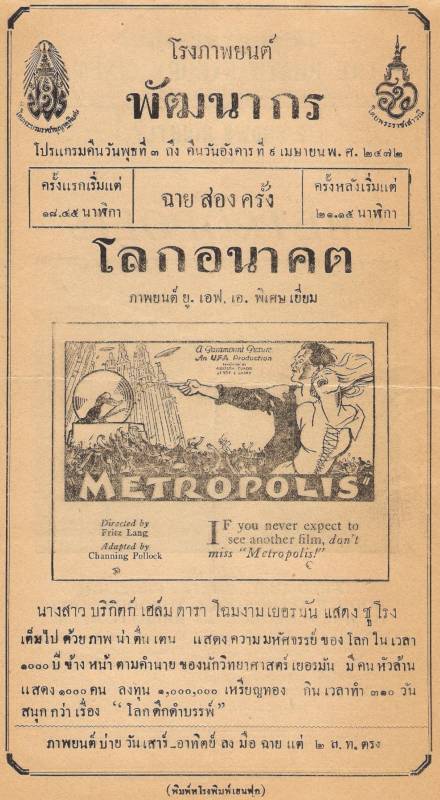
The Distribution company that released the film resided in Singapore. As can be seen in the Handbill, this was the Pollock version.
China
Length: Unknown
Censorship/Classification: Unknown
Premiere:12/04/1929, Shanghai, ?
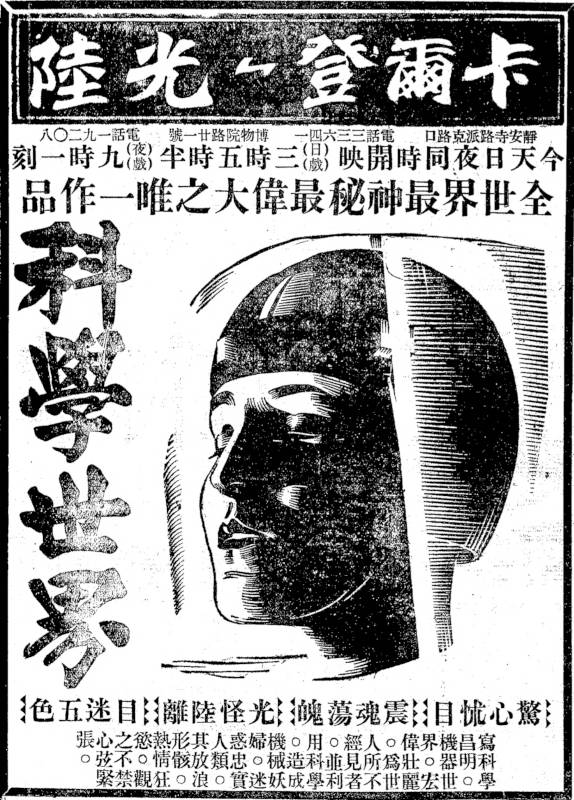
Originally called 科學世界 (or 科学世界) the name translates to: "Science world", or "World of Science". Today Metropolis' name is translated literally to 大都會. Only other piece of information is a French notice in a newspaper that the film was supposedly a hit in Shanghai (Excelsior, 07/06/1929),
Korea
Length: Unknown
Censorship/Classification: Unknown
Premiere: 01/05/1929, Seoul, "Chosun Theatre"
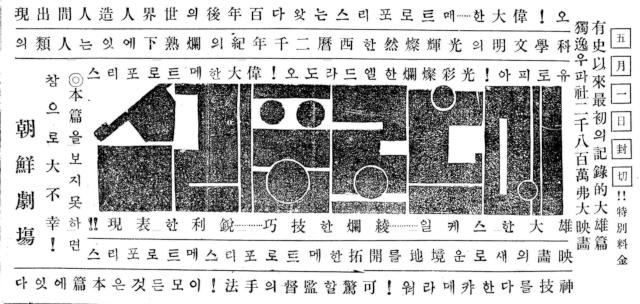
The Fourth Season: 1929/30
Syria
Length: Unknown
Censorship/classification: Unknown
Premiere: 08/07/1929, Damascus, "Cine Arnous"
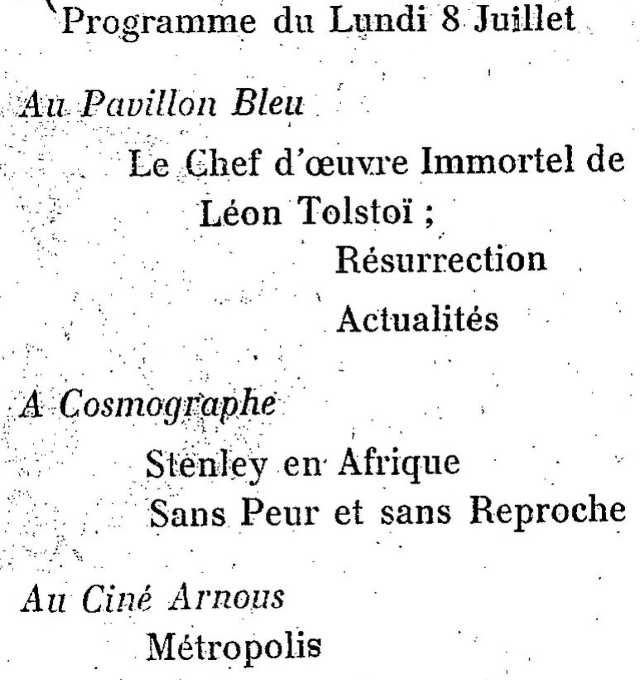
Vietnam
Length: Unknown
Censorship/classification: Unknown
Premiere: 10/07/1929, Ho Chi Minh City (Saigon), "Eden Cinema"
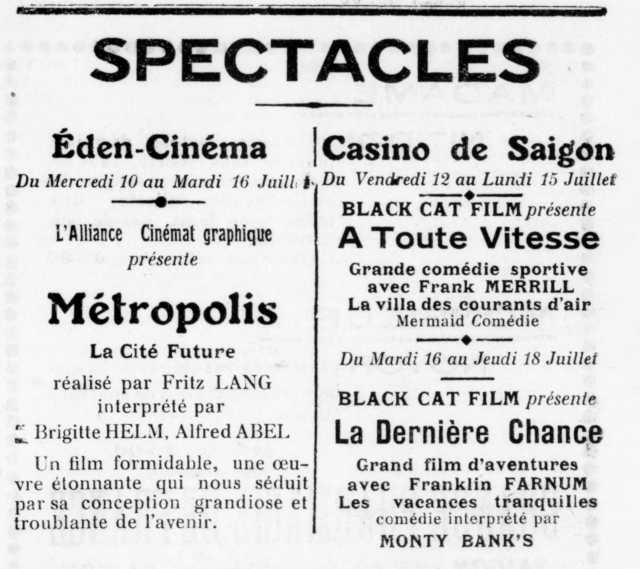
The film was shown in Hanoi (Cinema Tonkinois) on 09/05/1930
The Fifth Season: 1930/31
Dominican Republic
Length: Unknown
Censorship/classification: Unknown
Premiere: 18/11/1930, Santo Domingo, "Capitolio"

Probably based on the Pollock version.
Colombia
Length: Unknown
Censorship/classification: Unknown
Premiere: 22/11/1930, Bogotá, "Gran Salon Olympia"
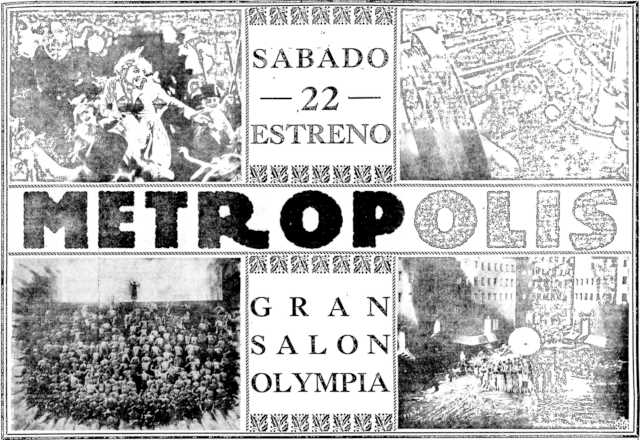
Unknown Version.
Unknown Premiere dates:
Egypt
Length: Unknown
Censorship/classification: Unknown
Showing: November 1928?
That the film was shown in Egypt is noted in "Der Kinematograph", 25/11/1928. Reportedly it had some problem with local censorship because it was considered Communist, and in general was not a big success.
Peru
Length: Unknown
Censorship/classification: Unknown
Showing: 05/09/1929?, Lima?
All I could find is an incomplete clipping from the "Mercurio Peruano" with the above date at the end of the article.
Not released
U.S.S.R.
Length: 3700m
Censorship/Classification: 16/04/1929, Protocol Nr. 2968
According to conversation of Michael Organ with Vladimir Dmitriev of the Gosfilmofond, the film wasn’t shown in the U.S.S.R until the mid 1960’s. Additional information from the documentary "Die Reise nach Metropolis" (Artem Demenok, ARTE, 12/02/2010).
Liechtenstein
In local newspapers no indication exists of a release or showing until the release of the Moroder version in the 1980s.
Last update: 28/05/2024